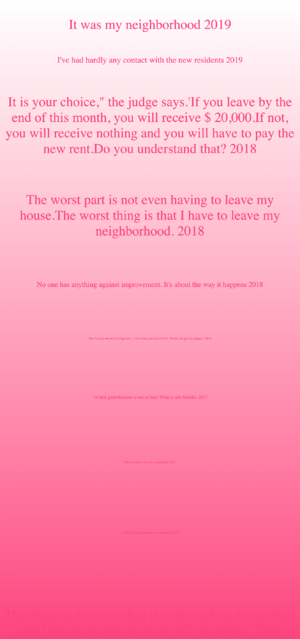User:Zpalomagar/ATLAS: Difference between revisions
Zpalomagar (talk | contribs) |
Zpalomagar (talk | contribs) |
||
| Line 1: | Line 1: | ||
==Speculative Atlas== | ==Speculative Atlas of counter-cartographies== | ||
This is the beginning of an experimental cartography collection that amplify anti-gentrification voices in the city of Rotterdam. It is a space to collect, process and visualises data and information that are lost online and offline and express people feelings about house speculation. Big data is starting to be too big to be processed and a lot of information is buried in huge datasets. Therefore, I’m going to experiment with the construction of small social data sets coming from real voices far away from statistic models. Densifying cities doesn’t have to imply a negative connotation but it is if voices that are against densification models and urban plans are silenced and misrepresented. As an architect I believe in the importance of working with communities hand in hand in order to build better societies, vulnerable voices deserve a space to be heard. This is a collection of brave cartographies that map resistance, fight and effort to improve the city. | This is the beginning of an experimental cartography collection that amplify anti-gentrification voices in the city of Rotterdam. It is a space to collect, process and visualises data and information that are lost online and offline and express people feelings about house speculation. Big data is starting to be too big to be processed and a lot of information is buried in huge datasets. Therefore, I’m going to experiment with the construction of small social data sets coming from real voices far away from statistic models. Densifying cities doesn’t have to imply a negative connotation but it is if voices that are against densification models and urban plans are silenced and misrepresented. As an architect I believe in the importance of working with communities hand in hand in order to build better societies, vulnerable voices deserve a space to be heard. This is a collection of brave cartographies that map resistance, fight and effort to improve the city. | ||
Revision as of 14:46, 4 December 2019
Speculative Atlas of counter-cartographies
This is the beginning of an experimental cartography collection that amplify anti-gentrification voices in the city of Rotterdam. It is a space to collect, process and visualises data and information that are lost online and offline and express people feelings about house speculation. Big data is starting to be too big to be processed and a lot of information is buried in huge datasets. Therefore, I’m going to experiment with the construction of small social data sets coming from real voices far away from statistic models. Densifying cities doesn’t have to imply a negative connotation but it is if voices that are against densification models and urban plans are silenced and misrepresented. As an architect I believe in the importance of working with communities hand in hand in order to build better societies, vulnerable voices deserve a space to be heard. This is a collection of brave cartographies that map resistance, fight and effort to improve the city.
Testimonial Map
<!DOCTYPE html>
<html>
<head>
<meta charset="utf-8">
<title>TESTIMONIAL MAP</title>
<script src='https://d3js.org/d3.v3.min.js'></script>
</head>
<body>
<div id = "help" style="position:relative;">
</div>
<script>
d3.csv("testimonymap_O.csv", function(data) {
console.log(data);
var canvas = d3.select("body")
.append("div");
canvas.selectAll("div.text")
.data(data)
.enter()
.append("div")
.attr("class","text")
.attr("title",function(d) {return d.WHO})
.on("mousemove", function(d){
var c = d3.mouse(this)[0];
console.log(this,c);
d3.select("#help").text(d.WHO).style("top", d3.event.pageY +"px")
})
.style("font-size",function(d){return d.AGE + "px";})
.text(function(d) {return d.WHAT + " " + d.YEAR;})
.sort(function(x,y){
return d3.ascending(x.YEAR, y.YEAR);
})
.style("margin-top", function(d, i) { return i * 20 + 10 + "px";})
canvas.selectAll("div.text")
.filter(d => !d.YEAR).remove()
.filter(d => !d.AGE).remove()
})
</script>
</body>
</html>
Resistance Map
<!DOCTYPE html>
<html>
<head>
<link rel="stylesheet" href="https://unpkg.com/leaflet@1.6.0/dist/leaflet.css"
integrity="sha512-xwE/Az9zrjBIphAcBb3F6JVqxf46+CDLwfLMHloNu6KEQCAWi6HcDUbeOfBIptF7tcCzusKFjFw2yuvEpDL9wQ=="
crossorigin=""/>
<script src="https://unpkg.com/leaflet@1.6.0/dist/leaflet.js"
integrity="sha512-gZwIG9x3wUXg2hdXF6+rVkLF/0Vi9U8D2Ntg4Ga5I5BZpVkVxlJWbSQtXPSiUTtC0TjtGOmxa1AJPuV0CPthew=="
crossorigin=""></script>
</head>
<body>
<div id="mapid" style="width: 100%; height: 1000px;"></div>
<script type="text/javascript">
var mymap = L.map('mapid').setView([51.91695582709645, 4.45770263671875], 13);
L.tileLayer('https://server.arcgisonline.com/ArcGIS/rest/services/Canvas/World_Light_Gray_Base/MapServer/tile/{z}/{y}/{x}.png', {
attribution: '© <a href="http://osm.org/copyright">OpenStreetMap</a> contributors'
}).addTo(mymap);
var pinkicon = L.icon({
iconUrl: 'MAPICON.png',
iconSize: [60, 84], // size of the icon
shadowSize: [50, 64], // size of the shadow
iconAnchor: [29, 81], // point of the icon which will correspond to marker's location
shadowAnchor: [4, 62], // the same for the shadow
popupAnchor: [-3, -76] // point from which the popup should open relative to the iconAnchor
});
var marker = L.marker([51.910391, 4.495962], {icon: pinkicon}).addTo(mymap);
var circle = L.circle([51.934661, 4.48195], {
color: '#00FA9A',
fillColor: 'none',
fillOpacity: 0.5,
radius: 400
}).addTo(mymap);
var polygon = L.polygon([
[51.930771, 4.473903],
[51.929461, 4.476392],
[51.929964, 4.477315],
[51.931195, 4.474483]
],{
color: '#FF1493',
fillColor: '#FF1493',
fillOpacity: 0.5
}).addTo(mymap);
function onMapClick(e) {
alert("You clicked the map at " + e.latlng);
}
</script>
</body>
</html>

